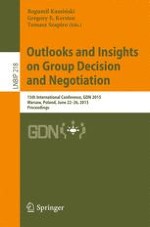2015 | OriginalPaper | Buchkapitel
How to Order the Alternatives, Rules, and the Rules to Choose Rules: When the Endogenous Procedural Choice Regresses
verfasst von : Takahiro Suzuki, Masahide Horita
Erschienen in: Outlooks and Insights on Group Decision and Negotiation
Aktivieren Sie unsere intelligente Suche, um passende Fachinhalte oder Patente zu finden.
Wählen Sie Textabschnitte aus um mit Künstlicher Intelligenz passenden Patente zu finden. powered by
Markieren Sie Textabschnitte, um KI-gestützt weitere passende Inhalte zu finden. powered by
